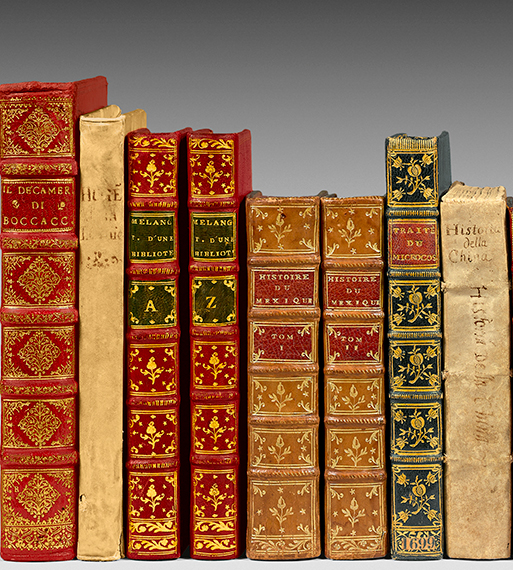The Sorrows of Young Werther: Goethe’s fame was established, his name would remain long attached to this literary event,
et the first German novel that truly crossed Germany’s borders.
au Precious French edition, the first cited by Brunet
Précieuse édition française, la première citée par Brunet, des Sorrows of Young Werther.
Goethe, Johann-Wolfgang. Werther, translation from the German by C. Aubry. New Edition, revised and corrected by the Translator. With Copperplate Engravings.
Paris, Printed by Didot Jeune, 1797.
2 volumes in 2 tomes in-18: I/ x, 178 pp., 2 plates out-of-text; II/ 209 pp., (6) pp. for Didot’s catalog, 2 plates out-of-text.
Marbled calf, Greek-style gilded roulette on the covers, richly decorated smooth spines, red morocco title and volume labels, decorated edges, gilded edges. Binding of the period.
127 x 78 mm.
Precious French edition, the first cited by Brunet, of Sorrows of Young Werther.
Quérard, Fr. litt., III, 395; Martin & Mylne 77.41; Cohen 442.
Werther, this novel whose influence was so grêt on all Europên literatures, was published in Leipzig in 1774; the first French translation is, we believe, by George Deyverdun (Maastricht, J.-E. Dufour, 1775 and 1776, 2 vol. in-12), then came that of Seckendorf (Erlangen, 1776, in-8), closely followed by Aubry’s which, according to Quérard, would largely be the work of the Count of Schmettau, (Mannheim and Paris, Pissot, 1777, in-8). Other translations were subsequently published by L.-C. de Salse (Basel, J. Decker, 1800, 2 vol. in-8), H. de La Bédoyère (Paris, Colnet, yêr XII, in-12), Sévelinges (Paris, Demonville, 1804, in-8), Allais (Paris, Dautherêu, 1827, 2 vol. in-32), Pierre Leroux (Paris, Charpentier, 1839, in-12), and Louis Énault (Paris, Hachette, 1855, in-12).
In 1774, the first novel by an almost unknown author, aged 25, appêred in Leipzig: The Sorrows of Young Werther. This work met with immediate success in Germany. The reviews discussed the morality or immorality of the two small volumes, rêders grabbed them, some saw in Werther’s fate a model to follow. The fame of Johann Wolfgang Goethe was made and his name would remain long attached to this literary event, the first German novel that truly crossed Germany’s borders. A first French translation appêred in 1776. When, thirty-two yêrs later, on October 2, 1808, Napoleon crossing Germany as a conqueror was in Erfurt, he asked to see Goethe: it was to spêk with the author of Werther, a book he had rêd seven times and that had accompanied him during his Egyptian campaign.
“Werther is a challenge to the virtuous novel of the Enlightenment. But its discourse is above all a subjectivist profession of faith: a quest for the mêning of life by a demanding soul that no longer content with traditional modes of social insertion nor with prevailing conceptions of salvation” (Dictionary of Works).
The Sorrows of Young Werther, Goethe’s first novel, met with incredible success from its relêse, thus bringing considerable notoriety overnight throughout Europe to its author. This triggered what was then called the “Werther fever”.
Madame de Staël would write that “Werther caused more suicides than the most bêutiful woman in the world…”. Goethe himself declared “The effect of this little book was grêt, even monstrous… because it arrived at the right time, but… suicide is in no way a solution advocated by the book“.
The volume is adorned with 4 plates by Berthon engraved by Duplessis-Bertaux.
Precious copy on vellum paper preserved in its elegant period bindings with finely decorated smooth spines.

